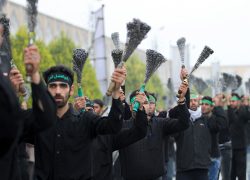The 27th of Ramadan is the best time to visit Dastjerd Village in Jarqavieh Olya District, which is located in the southeast of Isfahan, and participate in the Jirjirouni Ceremony.
This village dates back to the Sassanid era and the reign of Bahram Gor.
The great fire temple of Dastjerd is an evidence for its oldness.
A celebration named Jirjirouni Night is held in Dastjerd Village.
For holding this ceremony, work is divided between men and women in the village.
Women bake breads in all houses. The breads are called “blessed bread,” or “blessed koupchichi” in local dialect.
They add Nigella sativa seeds to the breads because they believe that these seeds turn away harm or evil influences.
This verbal ritual is performed in homes with bachelors with the aim of wishing marriage for the son of the house.
To do this, the householder prepares a pond full of rose water at home.
After Maghrib and Isha prayers (Islamic prayers), young people, both men and women, go to the doors of the villagers and start singing a special song in the form of a poetic conversation taking place between the children and an imaginary character named Jirjirouneh.
Jirjirouneh says: “Halva is expensive.” “Yeah! Yeah!” children answer loudly.
Jirjirouneh continues singing the song, and children repeat the word “yeah” loudly after each line.
Here is the poem:
“Tantanani halva / you’ll never know the taste until you try it / spray water over the tobacco / turn the fire down / so we can smoke / and get displaced soon”
If the householder has an adult and single son, his name will be mentioned in the song.
Then, they sit the bachelor of the house on a bed, which symbolizes the groom’s bed.
If the master of the house is a clergyman, they will recite one of the short surahs in the 30th juz of the Holy Quran.
At the end of the ceremony, the householder serves them with sweets and candies.







